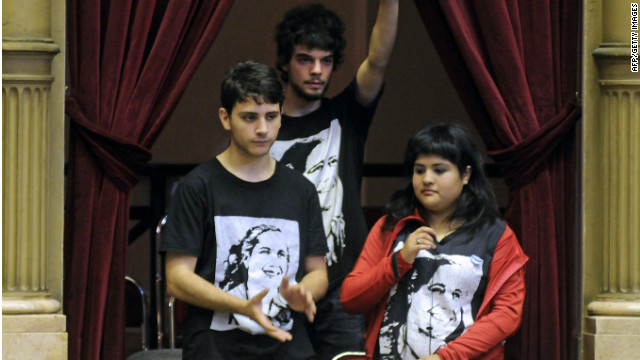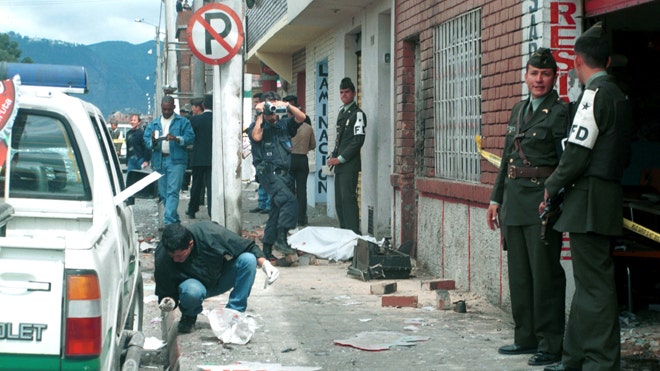By Margaret Janelle R. Hutchinson
Impunity Watch Reporter, South America
BOGOTÁ, Colombia – 10 peasant farmworkers were brutally massacred in the northwestern region of the country Wednesday evening, allegedly for failure to make an extortion payment to a violent paramilitary successor group, which gunned them down in a scene described by a local official as “something out of hell.”

After the farmworkers had finished picking fruit for the day, three men approached the farm’s foreman and asked if the owner had been paying protection money. When he replied that they didn’t know of any payment, the men opened fired, indiscriminately shooting, first handguns, then rifles, and finally launching a hand grenade at the farmworkers, according to one survivor.
“This case has shocked us for the barbaric, brutal way that they murdered these completely innocent people,” said Police Gen. David Guzman. 9 men and 1 woman were killed in the massacre.
The owner of the farm, in the municipality of Santa Rosa de Osos, about 275 kilometres (170 miles) northeast of the capital of Bogotá, was apparently being extorted by a paramilitary group, local officials said.
Local officials and police, from Santa Rosa de Osos, suspect that the bloodbath was the work of a violent offshoot of the Norte del Valle cartel, involved in drug trafficking, extortion and murder.
Known as paramilitary successor groups, these criminal bands are heavily armed drug-trafficking gangs that emerged following the ostensible demobilization of the AUC militia federation in 2006.
The group thought to be responsible in this case, Los Rastrojos or The Scraps, is also blamed for the last major massacre in Colombia, in August of 2009, where 12 members of the Awa indigenous tribe were killed in southwestern Narino state. Yesterday’s massacre took place in the northwestern Antioquia province, roughly 200 miles from Narino.
A report from the Indepaz think tank released in February said the paramilitary successor groups Los Rastrojos, Los Urabeños, Las Aguilas Negras, Los Paisas and ERPAC had a presence last year in 406 municipalities in 31 Colombian provinces.
Meaning, the groups have expanded their influence by 147 municipalities from 2008, when they were active in 259 of the Andean nation’s 1,110 municipalities.
Local businessmen from Santa Rosa de Osos, have reported a rise in extortion in the area.
They have recounted how members of criminal gangs have been going around the area demanding payments, which they adjust according to the earnings of each individual victim.
According to their reports, the payments have varied from $50 for day laborers to $50,000 for owners of large agricultural businesses.
Francisco Jair Lopera, mayor of Santa Rosa de Osos, called the massacre a source of national shame.
A National Police spokesperson said the regional National Police commander, Col. Jose Gerardo Acevedo, traveled Wednesday night to the massacre site, at La España tamarillo farm, to coordinate efforts to track down the assailants.
For further information, please see:
The Associated Press – 10 peasants killed in Colombian massacre – 8 November 2012
BBC News – Ten Colombian farmworkers killed ‘by extortion gang’ – 8 November 2012
Hispanically Speaking News – Blog del Narco: 10 Farmworkers Massacred by Colombian Drug Trafficking Gang – 8 November 2012
Huffington Post – Los Rastrojos, Colombia Drug Cartel, Massacre 10 Peasants Near Bogota – 8 November 2012
Latin American Herald Tribune – 10 Farmworkers Massacred in Colombia – 8 November 2012
The Province – 10 peasants killed by drug-trafficking paramilitaries in Colombia’s worst massacre since 2009 – 8 November 2012
SF Gate – 10 peasants killed in Colombia massacre – 8 November 8, 2012
The Washington Post – 10 peasants killed by drug-trafficking paramilitaries in Colombia’s worst massacre since 2009 – 8 November 2012



